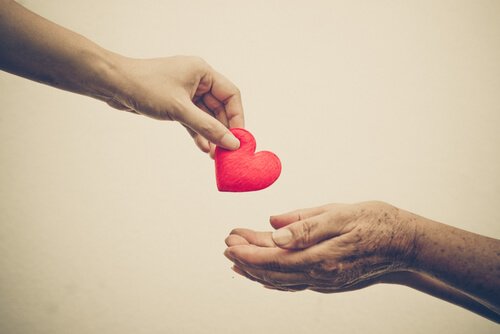
Helping your loved ones is a quality of character. But it may happen that our good intentions become useless and dysfunctional.
The solution is not to stop helping completely, but to set limits when they are abusing you.
Here are some warning signs that will help you know when you are giving too much.

1. Your help encourages codependence, irresponsibility, incompetence or bad character
Sometimes, we have to face the fact that our good intentions have gone badly. This is obvious when you continuously help the same person, even if you spend your own resources ...
Healthy help promotes the growth of others, independence and the development of their potential. Use your energies and resources to help people and causes that truly benefit.
2. The other person has violated numerous agreements, always asks for help and does not use it to do what was promised
It is time to stop believing and give opportunities to those who have shown not value them. At least until you have solid proof that you are ready to use your help to move forward in your life. Continuing will only cause that person to continue failing and you will feel angry and resentful.
3. Your help causes the other person to stagnate in your life
You can be very useful when creating processes that facilitate the advancement of your friends in certain aspects. But if the help is excessive, you condemn them to not learn to develop their abilities.
Thus, you prevent them from developing new skills and discovering or exploring all their abilities. This also applies to overprotective parents who avoid any failure to their children.
Failure is vital to grow

4. To help you must commit a dishonest act or compromise your integrity
Deceiving others to help a friend or telling lies for him are two examples of unhealthy acts. You can not help someone if it will make you disappoint others, keep very serious secrets or lack your moral code.
The worst thing is that if you continue you could find yourself under a ball of lies that really affect you ...
5. You feel manipulated to help
Sometimes, manipulation is so obvious that we really feel uncomfortable. But if you are a person who feels guilty for saying no, you might not listen to that instinct.
Just remember that manipulation is the sign that someone is looking to take advantage of you. Analyze the situation and if it really bothers you to give that help, avoid it.

6. It has already become impossible to continue to help
The limit of aid is that point at which you begin to sacrifice your physical or mental health, your economic well-being or your principles.
Sometimes, you need to avoid helping when you really have nothing to contribute without putting yourself at risk. You can only help if you are well.
7. Your relationships deteriorate or are simply irreparably damaged
The help you give to others also makes you grow and improve in your relationships. If they begin to be affected by fraud, conflict, feelings of obligation or resentment, they are a problem.
It may be enough to walk away a bit to see the situation from another perspective. In the worst case, the relationship may be fractured in its entirety. If this happens, there is rarely anything to do, but at least you will have the experience.
8. Your help prevents the other person from being healthy
As much as you are an optimistic person, you have to learn to admit when someone has problems or challenges that require professional help.
Withdrawing the help can help the other person take control and face their situation. Your help will be more useful if you can get the other person to connect with the appropriate professional resources. These can be a treatment, exercise, eating a healthy diet, etc.
We grow up in a society where they teach us that giving makes us good in front of others. But they seldom teach us to set limits and we grow without doing so. These limits are what make us feel more secure and guarantee that when we give we will not get lost.
Therefore, begin to establish your limits and date to respect. You also have the right to take care of yourself.
